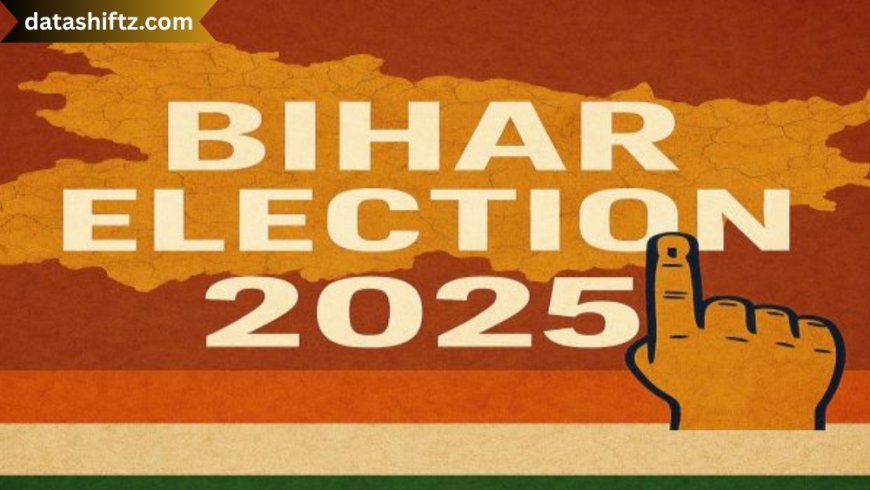Bihar Election 2025: The Road to a Political Crossroads

Introduction
As India prepares for a series of crucial state elections, Bihar Election 2025 stands out as a key political battle that will shape the future of the eastern state and potentially influence national politics. Known for its dynamic political landscape, caste-based equations, and active voter participation, Bihar has often been at the center of political transformation in India. With the 2020 elections resulting in a closely contested outcome, the upcoming 2025 polls are expected to be fiercely competitive, ideologically diverse, and deeply rooted in ground realities.
This blog post takes an in-depth look at the Bihar Legislative Assembly Election 2025 — analyzing political alliances, key players, voter demographics, challenges, and emerging trends. Whether you are a political enthusiast, journalist, or a curious citizen, this detailed overview provides everything you need to know about the high-stakes Bihar election.
Political Background of Bihar
A History of Coalition Politics
Bihar has long been a battleground for political ideologies, power shifts, and coalition experiments. With regional leaders like Lalu Prasad Yadav, Nitish Kumar, and newer entrants like Tejashwi Yadav, Bihar’s political narrative has seen frequent realignments between national parties like the Bharatiya Janata Party (BJP) and Indian National Congress (INC), and strong regional forces like Rashtriya Janata Dal (RJD) and Janata Dal (United).
2020 Election Recap
The 2020 Bihar Legislative Assembly election resulted in a narrow victory for the National Democratic Alliance (NDA), led by Nitish Kumar and the BJP. Despite the RJD-led Mahagathbandhan (Grand Alliance) emerging as the single-largest coalition in terms of vote share, NDA managed to form the government with a slender majority.
Key stats from 2020 election:
| Parameter | Data |
|---|---|
| Total Seats | 243 |
| NDA (BJP + JD(U) + allies) | 125 seats |
| Mahagathbandhan (RJD + INC + Left) | 110 seats |
| Voter Turnout | Approx. 57% |
| Chief Minister | Nitish Kumar (JD(U)) |
Bihar Election 2025 – What’s at Stake?
Why This Election Matters
The 2025 election will be a litmus test for coalition durability, public perception, and governance. With growing youth dissatisfaction, concerns over unemployment, and shifting caste alliances, the next election may well redefine Bihar’s political balance.
Major Political Parties and Leaders
| Political Party | Leader | 2020 Performance | Key Focus for 2025 |
|---|---|---|---|
| BJP | Samrat Choudhary (State President) | 74 seats | Development, Hindu unity |
| JD(U) | Nitish Kumar | 43 seats | Governance, social justice |
| RJD | Tejashwi Yadav | 75 seats | Youth, jobs, backward upliftment |
| Congress | Akhilesh Prasad Singh | 19 seats | National role, minority rights |
| Left Parties (CPI, CPI(M), CPI(ML)) | Collective leadership | 16 seats (combined) | Farmers' rights, workers' rights |
Key Issues Likely to Shape the Election
Economic Concerns
Bihar remains one of India’s least industrialized states, with high unemployment, especially among the youth. Migration to other states continues, and the state’s GDP growth, though improving, still lags behind national averages.
Top Economic Issues:
-
Job creation and employment schemes
-
Industrialization and investment
-
Urban infrastructure development
-
Agricultural support and irrigation facilities
Education and Healthcare
While Bihar has made strides in improving literacy rates and primary education, teacher vacancies, poor school infrastructure, and healthcare accessibility remain significant challenges.
Government schemes under scanner:
-
Mukhyamantri Nishchay Yojana
-
Jal-Jeevan-Hariyali Mission
-
Bihar Student Credit Card Scheme
Social and Caste Dynamics
Role of Caste in Elections
Caste continues to play a pivotal role in Bihar elections. The Yadav-Muslim (MY) combination is traditionally associated with RJD, while upper castes and OBCs are major supporters of BJP and JD(U).
Women and Youth Participation
Women voters in Bihar have shown increasing turnout over the last two elections, influenced by welfare schemes like free bicycles for girls and gas connections. The youth electorate—who voted in large numbers for Tejashwi Yadav in 2020—will again be a deciding force in 2025.
Caste-wise Voter Influence in Bihar
| Caste/Community | Estimated Population Share | Major Supporting Party |
|---|---|---|
| Yadav | ~14% | RJD |
| Muslims | ~17% | RJD, Congress |
| Kurmi, Koeri (OBCs) | ~16% | JD(U), BJP |
| Upper Castes (Brahmin, Rajput, Bhumihar) | ~20% | BJP |
| Dalits & Mahadalits | ~16% | JD(U), RJD |
Election Strategies and Alliances
Pre-Poll and Post-Poll Alliances
As 2025 approaches, political parties are expected to forge new alliances or rekindle old ones to maximize vote share. Potential dynamics include:
-
RJD + Congress + Left may revive the Mahagathbandhan
-
BJP may look to dominate within the NDA or contest more seats independently
-
JD(U) may reconsider alliance structure based on political equations
-
Regional players like HAM (Hindustani Awam Morcha) and Vikassheel Insaan Party (VIP) may play kingmaker roles
Role of Social Media and Digital Campaigning
Unlike previous elections, digital campaigning will be pivotal in 2025. With increasing smartphone penetration and social media usage, platforms like WhatsApp, Facebook, YouTube, and Instagram will be battlegrounds for voter influence, especially among the youth.
Factors That Will Influence Bihar Election 2025
-
Performance of Nitish Kumar's current government
-
Unemployment rate and job creation record
-
Caste-based mobilization and community outreach
-
Alliance dynamics and coalition math
-
Youth voter sentiment and urban migration
-
Effectiveness of welfare schemes
-
Law and order situation in rural districts
-
Narrative building via digital campaigns
-
Leadership charisma – Tejashwi vs BJP faces
-
Inflation, price rise, and economic stress post-pandemic
Opinion Polls and Early Predictions
While it is still early for conclusive poll data, political observers predict a tight contest between RJD-led alliance and BJP-JD(U) combine. Nitish Kumar’s recent political shifts between alliances may influence trust among voters. Meanwhile, Tejashwi Yadav continues to gain traction as a youthful alternative promising employment and education reform.
Possible Scenarios:
| Scenario | Likely Outcome |
|---|---|
| Strong Mahagathbandhan Unity | RJD emerges largest party |
| NDA retains cohesion and voter base | BJP-JD(U) likely to hold power |
| New regional fronts emerge | Coalition government inevitable |
| Major voter swing from youth/women | Game-changing results possible |
Election Schedule and Key Dates (Tentative)
Though official notification is yet to be released by the Election Commission of India, the Bihar Assembly Elections 2025 are expected to be conducted between September and November 2025.
Tentative Timeline:
| Activity | Expected Date |
|---|---|
| Voter list publication | July 2025 |
| Notification of elections | August 2025 |
| Filing of nominations | August-September 2025 |
| Voting dates | September-October 2025 |
| Counting of votes | October-November 2025 |
Conclusion
The Bihar Election 2025 promises to be one of the most engaging and critical political contests in the country. With evolving voter aspirations, shifting caste dynamics, and the ever-changing nature of alliances, the outcome is difficult to predict but immensely important to watch. It is not just a state election — it is a reflection of the broader Indian democratic narrative where local issues, grassroots leadership, and people-centric politics take center stage.
As the countdown begins, political parties are gearing up to connect with Bihar's 12-crore strong population. Whether the mandate favors continuity or change will depend on how well parties understand and address the core aspirations of the people.






























